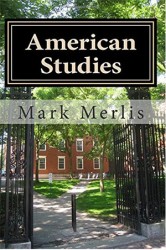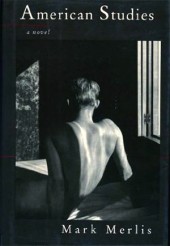 American Studies
American Studies
by Mark Merlis
Published by Houghton Mifflin
Published September 9, 1994
Fiction
272 pgs. • Find on Amazon.com • WorldCat
Reviewed by Stephen O. Murray
April 10, 2016.
Mark Merlis, who was born in 1950, published his first novel, American Studies, in 1994.
It is set in 1989 in the wry mind of Reeve, a 62-year-old D.C. mid-level bureaucrat (GS-12) who is hospitalized after being beaten by a trick who became irritated to the edge of homicide by not finding more money to rob than his agreed-on fee of $100.
Reeve recalls being sexually used by working-class youth and men in a New England mill town as a youth. He escaped to a Boston-area university (that can only be Harvard) where, for a time, he was a favorite of a very sexually inhibited ephebophile, T.O. Slater, the founder of American Studies as a legitimate academic field—as in reality Harvard professor F.O. Matthiessen (1902–1950) had been.
Matthiessen was an independently wealthy homosexual leftist. Reeve’s mentor lives a longer life (1894–1952) which, like Matthiessen’s, ends in suicide. He was a WWI veteran, seemingly became a member of the Communist Party (as Matthiessen did not), and doted on butch-looking students whom Slater calls “Wheaties-eaters.” (Matthiessen had a long-time relationship until the death of painter Russell Cheney in 1945).
Although it is difficult to slough off the ways in which Matthiessen is the model for the persecution of Communists and homosexuals of the Truman era (with baying hounds Richard Nixon and Joe McCarthy), it is probably better to consider Slater a fictional character. The deeply internalized homophobia and loathing of “fairies” (also derided as “pansies”) is very vividly brought to life in our protagonist, Reeve, who considers those like him to be “fair game” to be robbed, beaten, and even killed—even in 1989.
We thought it was just in the natural order of things that the world would force us underground and punish us unremittingly, if we dared to show our faces.
Reeve’s hospital roommate embodies his “type”: working class, unintellectual, and, like Reeve’s tricks, unwilling to be defined by occasional sexual release with sexually complaisant homosexuals.
 Reeve is a connoisseur of backs (the cover of the first edition features a very apt George Platt Lynes photograph of a young male back), and he becomes enraptured by the views the hospital gown affords him of his roommate, who is very restless with a work-injured thumb he may lose.
Reeve is a connoisseur of backs (the cover of the first edition features a very apt George Platt Lynes photograph of a young male back), and he becomes enraptured by the views the hospital gown affords him of his roommate, who is very restless with a work-injured thumb he may lose.
Reeve spends more time imagining how his mentor, Slater, chose suicide than he does on his own past before the nearly fatal assault, a disturbance for which he is being evicted from his apartment of two decades’ residence. Reeve comes up with a scenario. Merlis could have intercut Reeve’s story with a more objective, third-person account of Slater’s fall, but Merlis is resolute about maintaining Reeve’s as the sole perspective.
The denouement of Slater’s story is more convincing than that of Reeve’s hospital story, though Reeve’s recollection of the trick that went dreadfully wrong is also quite convincing. Though a bit longer than it needed to be, American Studies is well written and well planned. It provides insight into the acceptance of inferior status and abjection that formed someone like Reeve in the bad old days, who was pretty fully formed (aged 42) by 1969 and still filled with self loathing two decades later—which is exacerbated by his also being two decades older.
©2016, Stephen O. Murray

